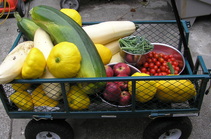 Garden Bounty
Garden Bounty While most of our country lies frozen and under snow in January, here in the Puget Sound Basin our gardens are soggy and damp but still productive. I pick Brussels sprouts, kale, cabbage, and carrots for dinner. I have beets ready. The lettuce is waiting to be picked. Lettuce is usually more delicate than the hearty heads I’m growing. That lettuce is strange. It should be dead.
It’s fun to brag about how productive my garden is. The ability to harvest dinner and still supply flowers for churches comes with a price. The grass is still growing. The weeds silently send out their long roots. We need to mow and weed, soon. I finally planted the last of my tulip bulbs. It’s time to prune. Some of the roses are not dormant and will die in a hard freeze.
Good farmers must watch their crops to let the plants tell us what they need and where they like to be planted. The crops tell us whether or not they want to grow in our location, if they are hungry or thirsty, or under attack. I wonder about that red head lettuce that is growing happily in a bed that is seriously shaded. It has survived weeks of freezing and a coat of snow. I will plant that variety forever, but it makes me wonder.
This winter as I watch, I see that despite several freezes most of the garden is still growing. That tells me that although I felt miserable in the cold weather, it wasn’t all that cold. Maybe my well-mulched gardens stay warmer, but the tops didn’t freeze down on my veggies and that lettuce still looks good. I must conclude that it wasn’t cold enough to kill cold-tolerant plants.
Like many other farmers, watching my gardens has led me to the conclusion that more than my years of exhausted inattention to the details of the gardens has been transforming my farm. I’m battling a global issue—climate change is real, at least on my little acre. Who knows what the weather will be next summer? We had hot and dry the past year that produced bumper crops of summer squash, tomatoes, and melons. My soil dried out in some beds killing the asparagus and an ornamental currant. The unpredictability influenced my seed buying this winter. Should I buy my favorite broccoli seed that has always produced for me but bolted last summer? Should I buy a more heat tolerant broccoli?
What about melons? The ones I grew last summer tasted so sweet and rich. Melons have never ripened in the Puget Sound Basin before, but now I’m seeing them at the farmer’s market. I’ll plant more of those luscious goodies. Snapdragons have been a staple in my flower business. They got sick in the heat last summer. Where can I plant them so they get enough sun but don’t get heat stress? Thankfully, when the snapdragons failed, the zinnia’s thrived. Is part of making my gardens work planting enough varieties that something will grow no matter what the weather throws at us? Currently, this is my plan, but I need more space.
Such is the fate of the modern farmer. We face personal challenges and our world has become more unpredictable than it has ever been. Through all of my trials trying to farm while sick, I’ve learned a few things. Mulching is vital to saving water and protecting the soil. Now, I cringe when I see bare dirt. Mulching helps regulate soil temperature, keeping it at an even temperature so that the roots of my plants are not traumatized by temperature swings. Mulch is one of my weapons against unpredictable weather.
I learned that putting a hose on a timer so that I am watering in the middle of the night is my best method for conserving water by making the watering I do more productive. Watering in the middle of the night, adds nighttime humidity that some plants need to thrive. I wish I could find a reliable timer.
I’ve learned that I need to expand my flowerbeds to give me room for more varieties to accommodate unpredictable weather. I may try new varieties that haven’t produced for me before and cut down on the space allotted to the snapdragons, but I love snapdragons and they will grow if the weather is anywhere near normal for the Pacific Northwest. These are the decisions I struggle with.
As a farmer, I will survive. My sales doubled last summer, and I met the demand through creativity, some fantastic zinnias, and hard work. I may add organic veggies to my stand if the economy is shaky. Always, I need to stay ahead of the curve in a world that changes constantly. This is the life of a true farmer.
 RSS Feed
RSS Feed